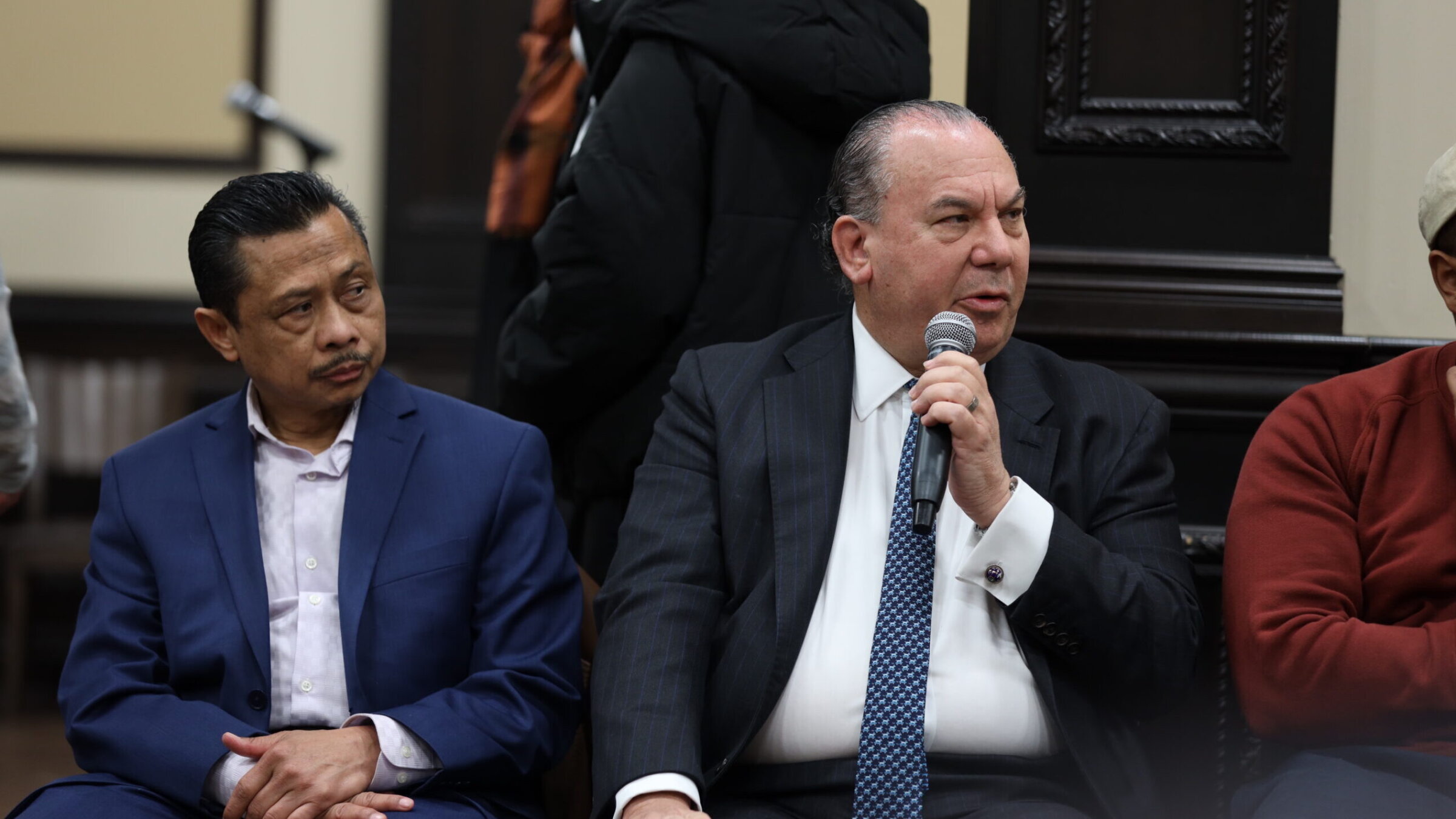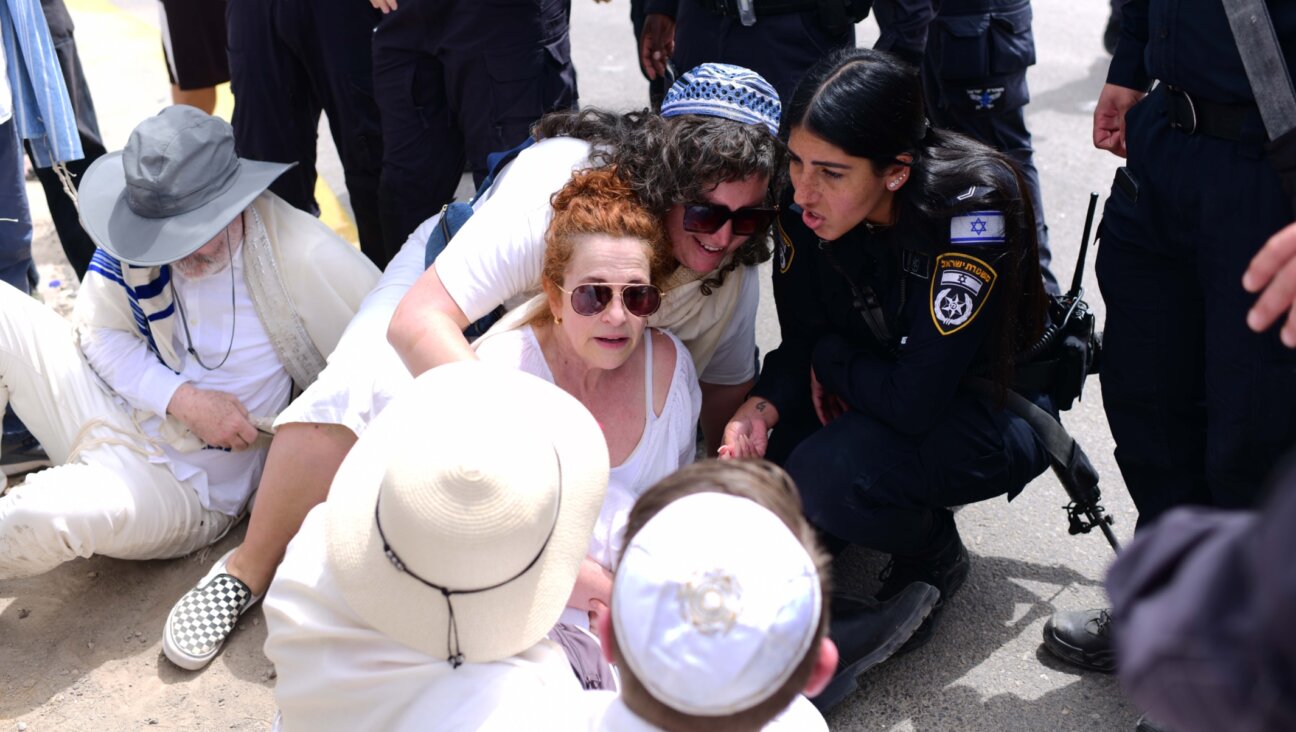A rabbi and an imam called a meeting of Jewish and Muslim students at Queens College. It yielded little common ground.

Imam Shamsi Ali, left, and Rabbi Marc Schneier, right, at Queens College in New York, November 16, 2023. (Courtesy of The Foundation for Ethnic Understanding)
(New York Jewish Week) – Students crammed into a meeting room on the leafy Queens College campus, some wearing keffiyehs, others kippahs. Kosher and halal food were served on a table at the back of the room, while late arrivals gathered at the door, listening to the rabbi and imam holding court at the center of the gathering.
“There are no two faith communities that have more in common than Islam and Judaism,” Rabbi Marc Schneier said, sitting next to his longtime partner in interfaith work, Imam Shamsi Ali. “We can agree to disagree, without being disagreeable.”
The meeting between the Muslim and Jewish students was meant to build bridges between the two groups amid fallout from the war between Israel and Hamas in Gaza that began with Hamas’ massacre of Israeli civilians on Oct. 7. But, in actuality, the gathering further exposed the deep chasms between their two communities, which did disagree — and were often disagreeable.
As the conversation on Thursday descended into shouting, a Jewish student fired across the room, “Oct. 7 is resistance?”
A Muslim student said, “Yes, Oct. 7 is resistance, according to the Geneva Convention.”
“At least someone said it,” the Jewish student said.
The conflict between Israel and Hamas has riven campuses in New York City and elsewhere, sparking heated clashes between student groups, as well as between students and administrators. An Israeli student was assaulted and a swastika was drawn on a bathroom wall at Columbia University, which later suspended two prominent pro-Palestinian groups. At Manhattan’s Cooper Union, Jewish students sheltered in a library as pro-Palestinian activists pounded on the doors and shouted slogans. Campuses across the city, including in the CUNY system, have seen tensions soar between rival pro-Israel and pro-Palestinian groups.
The Queens College gathering was similarly tense. At times, it devolved into shouting and mutual recriminations, although some individual students did appear to forge ties with classmates from the other side.
The New York Jewish Week was invited to cover the meeting on the condition that its student attendees not be identified by name so they could speak freely.
“Israelis are doing, in my opinion, what the Nazis did to them,” said the opening speaker, a Muslim. “This is how you create Hamas. If you want to know how to create Hamas, just keep bombing Gaza.”
“In my eyes as a Muslim, Palestinian and Israeli life – equal,” he said. “We have to be direct with each other.”
A Jewish student said, “A lot of our pain and suffering has been invalidated since Oct. 7. Right away, there was not a second to mourn. Automatically we had to defend ourselves.”
Citing student organizations on social media that had denied the atrocities, she said, “People were slaughtered. The world doesn’t care.”
She added, “I want to see my pain acknowledged.”
Queens College is part of the sprawling City University of New York system, which has been grappling with allegations of antisemitism for years. Jewish students and faculty have said Israel criticism often spills over into outright antisemitism, while Palestinians and their supporters have decried alleged attacks on free speech.
Around 50 students attended the hourlong meeting, perhaps the first formal gathering between Jewish and Muslim students on a New York City campus since Oct. 7, according to its organizers. Schneier and Ali previously held two meetings for students from several CUNY schools, one with only Muslims, and another with just Jewish students. They plan to hold several more gatherings.
“We are not here to convince you, whatever you have in mind, but we’re here to listen with the hope that we can build a sense of sympathy or empathy for one another,” Ali said.
Schneier is a prominent rabbi involved with outreach between Jews and Gulf countries; his Foundation for Ethnic Understanding focuses on Jewish-Muslim relations. He is also a member of CUNY’s Jewish advisory council. Ali is the leader of the Jamaica Muslim Center in Queens, one of the largest mosques in New York, with 20,000 members.
The students present included members of the campus Hillel and the Muslim Student Association. Muslim students outnumbered Jewish students at the meeting and held the floor for more of the discussion, using the forum to air historical grievances and complaints against the college administration. Jewish students said their pain after the Hamas attack had been dismissed, or even exacerbated, as some student groups denied or endorsed the atrocities.
One Jewish student read out a threat posted online to the group, her hands shaking, saying, “We were terrified.” Both groups also felt that their voices had been stifled.
A Jewish student said that graffiti threatening Jews had been etched around campus and that she hadn’t seen similar hate directed toward pro-Palestinian students. The Muslim students in attendance forcefully disagreed, with one woman saying, “It’s absolutely appalling to disregard all the hate that the Muslims on this campus have been receiving.”
The Jewish speaker said she understood and had not been aware of anti-Muslim incidents.
The rabbi and imam made repeated efforts to guide the conversation toward interfaith relations and the atmosphere on campus, and the students all unequivocally condemned discrimination against Muslims and Jews as well as civilian casualties. At one point, Ali said, “Both communities are victims, but it looks like we are opponents to each other, and that’s what we need — to find a way to make sure that actually we are not enemies to one another.”
Still, the discussion repeatedly turned to the war, with the students unable to agree on its basic facts. Muslim students disputed that Hamas was using civilians as human shields, frustrating the Jews in attendance, or that Hamas had targeted Israeli civilians on Oct. 7, citing a conspiracy theory that the Israeli military was responsible for most civilian casualties.
The Muslim students repeatedly objected to the pro-Israel position, bringing up the Palestinian death toll of 12,000, a figure provided by the Hamas-run Gaza Health Ministry that has not been externally verified and does not make a distinction between civilians and combatants.
In one heated exchange, a Muslim student said she had asked Israel supporters around campus if they condemned Israel. “I have not received a single yes,” she said. Pro-Israel students asked if she condemned Hamas, and she said she condemned the killing of innocent civilians on any side. Both groups said they were not “spokespeople” for the conflict’s combatants.
“What they accuse Hamas of doing today, they did — they’ve been doing for 75 years,” a Muslim student said. “The start date for you guys is Oct. 7,” another student said.
“A people who are occupied have a right to armed resistance. I know you don’t like hearing it but those are the facts,” a Muslim student said.
“People like you think they should lay back and let Israel slaughter them. No, we don’t want two states, we want one solution under pre-1948 borders,” he said, to applause, while one student held up a sign that said, “Bombing hospitals is not self defense.”
“We are trying to move forward as a community. We cannot fix the issues that present themselves in the Middle East,” a Jewish student said.
“It tears my heart hearing his pain, his family’s pain, it’s just awful,” a Jewish student said about the Palestinian speaker. “I think it would be great for us all to understand that there are bad people on both sides and there are great people on both sides.”
Later in the discussion, several Muslim students berated Ali, appearing to oppose his partnership with Schneier.
“Who told you to come here? Which Muslim? How much did they pay you?” one student said. “Say you’re a Zionist. You’re not welcome. Nobody wants you here.” He then led the room in several chants of “Allahu akbar,” an Arabic phrase meaning “God is the greatest.”
The Muslim students also repeatedly criticized the Queens College administration, saying the college had been overly supportive of Israel and that they had not been given a forum to express their grievances. The college president, Frank Wu, opened an investigation earlier this week into the Muslim Student Association after the group posted online that there was no evidence Palestinians had killed women and children, and justified Hamas taking civilians hostage.
The Oct. 7 attack by the terror group killed 1,200 Israelis and other nationals, mostly civilians, and took more than 200 others captive. Wu’s investigation sparked furious protests against the administration. Slogans attacking Wu and Israel were chalked on the sidewalk around campus.
“We’re not here representing CUNY. What do you want from us?” Schneier said.
After the meeting let out, the arguing continued outside the room, although some students seemed to forge connections in individual discussions.
A Muslim student spoke with a Jewish student, saying he had grown up in an environment that was not welcoming to Jews, but that his closest friend, whom he met in school, was Jewish. The two students bonded over the religions’ shared traditions, including fasting on holidays and eschewing pork.
“This is turning into a very Israel and Palestine thing, which it shouldn’t have, because it was an interfaith thing,” the Muslim student said. “It really hurts me a lot hearing terrible things being said about you guys because I for one don’t align with that.”
“I’m really happy that you came here,” the Jewish student said. “Jews, our religion, our values, it’s about a good world, good people, not doing violence. Everyone’s rights matter.”
Nearby, two students engaged in a heated but measured argument about the war, while two others showed each other information on their phones.
“I thought it was a good beginning,” Schneier told the New York Jewish Week after the meeting, pointing out that the complaints surrounding discrimination and stifled voices were mirrored on both sides. He said that an overflow room had been set up in case the two groups needed to be separated, which didn’t happen. “You’re planting a seed here,” he said.
“For some of the students, they grow in terms of their sense of empathy for the other side. It’s important for people to see it’s everyone’s pain,” Schneier said. “These kinds of discussions need to take place.”
This article originally appeared on JTA.org.

I hope you appreciated this article. Before you go, I’d like to ask you to please support the Forward’s award-winning journalism this Passover.
In this age of misinformation, our work is needed like never before. We report on the news that matters most to American Jews, driven by truth, not ideology.
At a time when newsrooms are closing or cutting back, the Forward has removed its paywall. That means for the first time in our 126-year history, Forward journalism is free to everyone, everywhere. With an ongoing war, rising antisemitism, and a flood of disinformation that may affect the upcoming election, we believe that free and open access to Jewish journalism is imperative.
Readers like you make it all possible. Right now, we’re in the middle of our Passover Pledge Drive and we still need 300 people to step up and make a gift to sustain our trustworthy, independent journalism.
Make a gift of any size and become a Forward member today. You’ll support our mission to tell the American Jewish story fully and fairly.
— Rachel Fishman Feddersen, Publisher and CEO
Join our mission to tell the Jewish story fully and fairly.
Only 300 more gifts needed by April 30






















